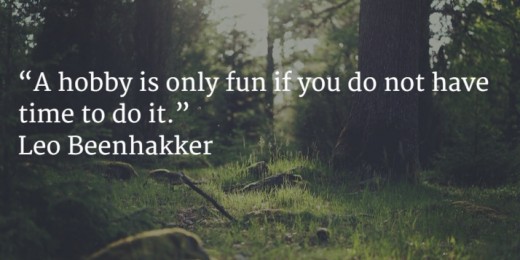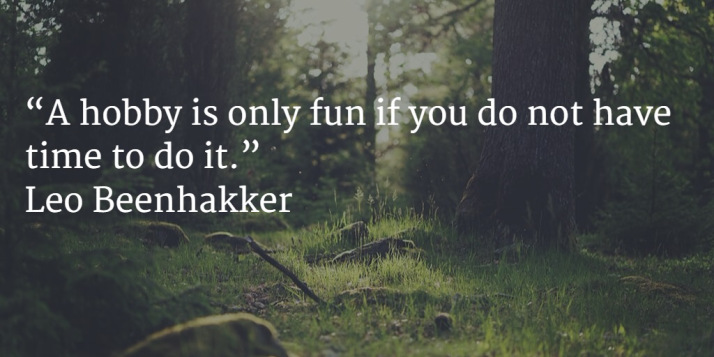The Benefits Of Stepping Back And Choosing A Hobby
August 19, 2015
Stop what you’re doing, and take a moment to consider this..
Do you ever feel burned out or bored with the same old routine?
- Work obligations…
- Family responsibilities…
Do you ever experience frustration over the complete lack of personal time and enjoyment?
If you said YES to any of that, you would benefit greatly by making room in your schedule for a hobby.
What do you think a hobby is?
Based upon my own experience, here’s my answer:
A hobby is a recreational activity separate from your work commitments, which bring you pleasure and build upon your passions, skills and interests.
The key point from that definition is: “recreational activity.”
If your chosen activity pertains to work responsibilities, it’s not a hobby.
You need to find one or more activities that interest you without falling back to your career, field or industry. Your hobby should be something you can commit to and feel passionate about.
It especially should not feel like a burden.

Some examples of hobbies include:
- Writing poetry
- Sewing
- Collecting valuables
The point of this article is to show you why hobbies matter and how you can include one in your busy schedule. At the end of this article, I provide recommendations and helpful resources to get you started with your hobby development.
Benefits
You may question why hobbies are important when you have what seem like more important things to do every day. Marketing yourself and your business takes a lot of time each day, I know, but the benefits of picking up a hobby might just convince you to give it a try.
Hobbies are great alternatives for increasing productivity in their own way. You might not see it right away, but hobbies can directly impact your other responsibilities in some ways.
Here are just 3 of the many benefits of hobbies:
1) Hobbies refresh your mind.
When you’re working hard on your marketing or other career, you are likely to burn out from time to time.
This is normal.
The question is: how do you recover?
The answer: you find a hobby that will give your mind a break.
Hobbies are great for this, so find one that will allow your mind to rest from the everyday routine.
2) Hobbies build upon your talents and skills.
Whether you’re currently happily employed or seeking a position somewhere, we all can use hobbies to make ourselves more marketable to employers.
If you have a wide range of skills or talents, you can use them to your advantage in interviews or at your current job.
For example:
I love to write, but I don’t get to do so at my current position as much as I would like. So, I built my blog during my free time. It gives me the opportunity to do something I love.
It also improves upon my writing skills, an essential factor to being a marketer.
3) Hobbies give you the opportunity to improve the lives of others.
Whether you’re writing or volunteering, you can almost always use your chosen hobby to the benefit of others.
For example:
I create latch hook projects (a form of sewing), whether they end up as pillows or wall hangings. When I finish a product, I give it away to someone who I feel would enjoy it.
These are just a few of the end products I gave away:

This pillow went to my aunts as their wedding gift.

Strategies for finding the time
It can easily become difficult to maintain a hobby because of your other obligations. Finding time for it is a challenge we all face, but it doesn’t have to be that way.

Here are three ways you can reserve time for your hobby:
1) Organize your calendar in a priority color code (red, yellow, green)
Work will always be most important (RED), but your hobby should have priority on weekends and evenings.
Your personal responsibilities have importance as well (YELLOW), but don’t let them get in the way when they don’t have to do so.
While your hobby is important, it will likely be given less importance during the work week (GREEN).
Make sure your calendar includes dedicated time for your hobby, even if it’s just at certain times or days of the week.
2) Add reserved time to your calendar instead of leaving the time slot blank
Your calendar can get full fast, but there will always be times when you have blank spaces on it.
Don’t leave those spaces blank. Instead, mark them as “RESERVED” in order to give yourself time to work on your hobby.
When you set up this reserved time, keep it that way whenever possible.
3) Use a task management or other alarm system to remind you
Sometimes, life can get in the way of our hobby. That’s where an alarm system will come in handy.
You can use a task management tool or simply set a recurring alarm on your phone.
When the alarm goes off, you’ll remember to take a break and work on your hobby.
Recommendations & Resources
You now know the benefits of developing a hobby as well as how to find the time, but what about how to get started?
- Do you wonder what to do next?
- Are you curious as to what hobby ideas are out there?
That’s where these recommendations and resources come in.
Getting started
- The first thing to do is find a hobby that interests you and that gives you a sense of accomplishment.
I’ve listed a few places where you can search for ideas here, including a handy quiz:
Which hobby best suits your personality? (CNN Quiz)
List of 50 low-cost hobbies (LIfehack)
How to Find a Hobby (Wikihow)
- The next thing to do is check the time commitment for your chosen hobby.
- Reserve that time on your calendar, and stick to it as much as possible.
- If something gets in the way, move that free spot to somewhere else if you can.
- Commit to your hobby from start to finish, and find a reason or purpose for your activity.
Did I miss anything?
Do you have any ideas you’d like to share with other readers?
Let us know by leaving a comment below!
Business & Finance Articles on Business 2 Community
(84)




